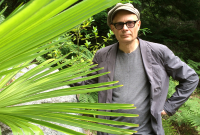Support strong Canadian climate journalism for 2025
After the forest in Indonesia that supported Mina Setra’s community was razed for a palm oil plantation, the Dayak Pompakng woman was forced to move to the city.
Setra recalled Thursday just how distressing it was to revisit where she once lived. “It’s like Mother Earth’s death,” she said.
“Does anybody realize how it would be to lose one’s mother?”
Setra, deputy secretary general of the Indigenous Peoples’ Alliance of the Archipelagos, made her remarks during a panel discussion on Indigenous people and forests, which took place before a live audience at the Ford Foundation in New York City.
At the Forests for Climate panel, Indigenous activists joined with researchers and celebrities as they addressed the need to safeguard land rights for Indigenous people who are the stewards of their regions’ forests.
Setra told the panel that with the loss of the forests, Indigenous people also lose their culture. They are absorbed into large cities where they are “no longer Indigenous people.”
The Ford Foundation event coincides with the growing threat to Indigenous environmental leaders who oppose projects that endanger their communities and forests.
In late March, illegal loggers wielding axes hospitalized Cambodian activist Phon Sopheak during a forest patrol. That same month, Honduran Lenca activist Berta Cáceres was murdered.
Over the five years ending in 2014, more than 450 environmentalists world-wide were killed, according to the international watchdog group, Global Witness. Disputes over industrial logging, mining and land rights most often prompt the deaths.

Diana Rios, an Indigenous Asheninka activist from the Amazon village of Saweto, Peru, knows of the violence first-hand. Her father, activist Edwin Chota and two other community members died at the hands of illegal loggers in 2014.
Through a Spanish translator she delivered an impassioned speech to the panel audience, saying the death of her father did not defeat her.
“This strengthens me to keep on going, as an Indigenous woman, as Indigenous people, I’m here to face this because this is my duty. This is my home,” she said to loud applause.
In 2015, Rios’ community received title to more than 80,000 hectares of forest, but in the face of ongoing intimidation and threats from illegal loggers, she continues to fight for its protection.
Film star Alec Baldwin drew a laugh when he prefaced his talk with the comment: “Regardless of the outcome of the election, I say Diana Rios for Secretary of the Interior.”
More seriously, Baldwin told the crowd that the tropical rain forests are essential. “If we keep chopping down the tropical forests at the rate we’re doing now, we’re lost.”
Baldwin said it’s necessary to invest in and empower the people protecting the forests. The actor said it’s imperative that the world leaders who will sign the Paris Accord on Friday do not ignore those issues.
“The absence of local land rights to forests is undermining your efforts to curb poverty, hunger, in addition to climate change. If we are serious about fighting climate change, we need to be serious about empowering the people who are protecting the world’s forests.”
The panel coincided with new research from the Woods Hole Research Centre that says properly managed tropical forests will provide 10 to 15 additional years to end the use of fossil fuels while keeping global warming under two degrees Celsius.
Besides their potential to store large quantities of carbon, the benefits of tropical forests include a positive impact on local and regional climates and help regulate local temperatures and rainfall.
The report said that stopping tropical deforestation and removing carbon from the atmosphere are not a complete solution for climate change, but they should be an important part of the equation.
"It is clear that it will be impossible to limit global warming to 2ºC at this point if we try to do it entirely by reducing fossil fuel use," Dr. Phillip Duffy, the president and executive director of the independent Woods Hole Research Centre, said in a statement.
"We will have to stop emissions from land use and remove large amounts of CO2 from the atmosphere. Proper management of tropical forests-stopping their destruction and reforesting previously cleared areas can do that,” Duffy said.
“At present there is no other way to remove as much CO2 from the atmosphere, at any price."
Media asked the panel what would happen if all the forests were removed.
“Forests act like the lungs of the planet,” Helen Clark, chair of the United Nations Development Group, said in answer to the question. “If we don’t have lungs, would we breathe?”
Frances Seymour, a senior fellow at the Centre for Global Development in Washington, D.C., was even more explicit about the role of forests.
Recent science is showing that forests are important in regulating weather patterns at continental and even cross-continental scale, Seymour said. If all the forested areas were logged, rainfall patterns across continental areas would be disrupted, which would “undermine the productivity of agriculture on a vast scale.”
Seymour pointed out that one of the consequences of climate change is more frequent and severe weather events, including droughts, floods and forest fires. She said intact natural forests provide protection against those types of events.





Comments